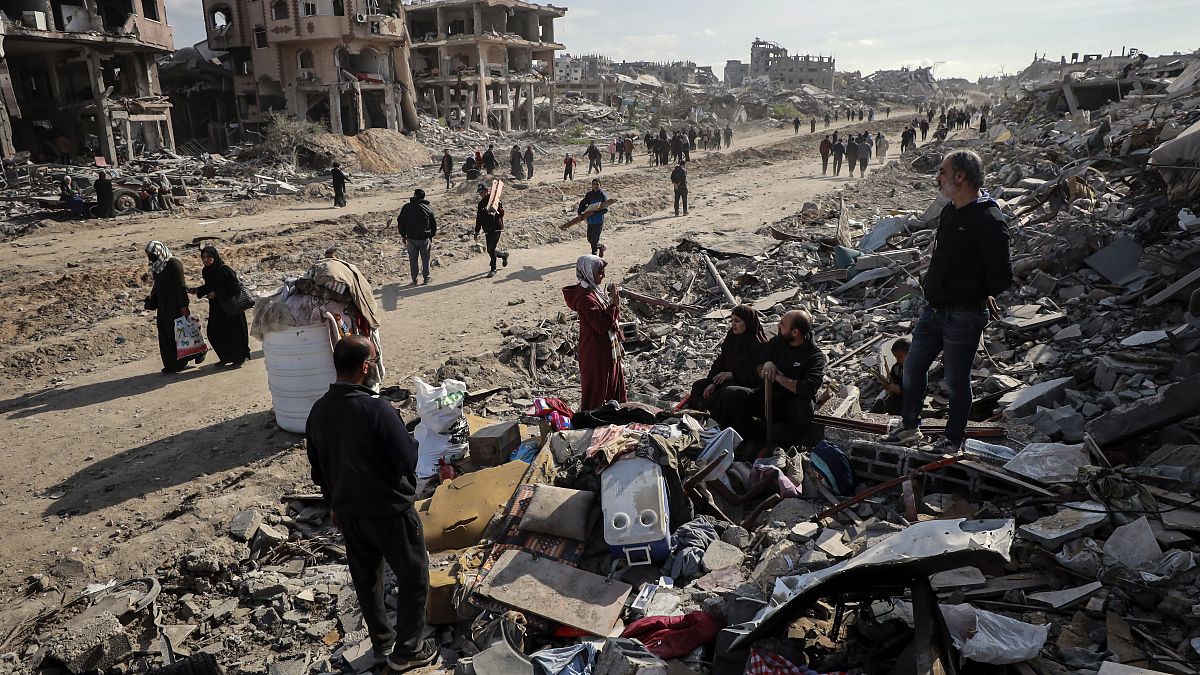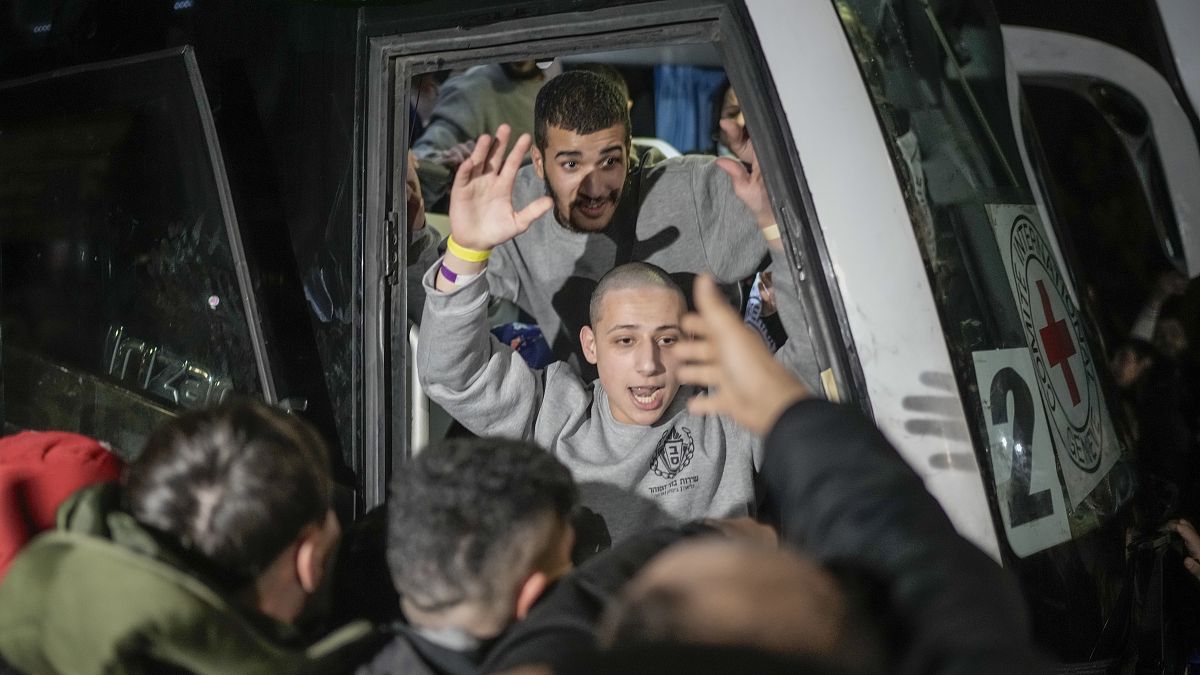Rina Reznik, a teacher-turned-medic, has been saving lives on the Ukrainian frontline since Russia's full-scale invasion began in 2022.
It takes Rina Reznik a few moments to remember what her life used to be like before 24 February 2022, when Russia started its full-scale invasion of Ukraine.
She smiles timidly and begins. “I just cannot remember. I cannot remember what my life looked like three years ago. What were my interests? How was I thinking?"
When Russia embarked on its all-out war against Ukraine, Reznik was a school biology teacher while also studying for her degree.
She has spent almost three years now serving in different brigades of the Ukrainian army, evacuating soldiers from the frontlines, providing the necessary first aid, and saving lives.
Euronews caught up with Reznik in Brussels, where she came to participate in a behind-closed-doors event on the impacts the war has had on Ukraine’s health system.
Being outside of Ukraine, away from the frontline and in a country at peace, felt alien to her, however.
"Europeans usually like to talk about work-life balance. In Ukraine we don't know war-life balance is like. All the life is sacrificed to this war,” Reznik said.
Reznik doesn’t foster any hard feelings, though, and says she understands why Europeans cannot fully comprehend what the Ukrainians have been going through over the past three years.
“I don’t think they understand completely. Same as I did not understand a lot of Syrian refugees who were in my city, Kharkiv, when I was a teenager. We were talking a lot about the Syrian refugees, but I don’t think I fully understood what it’s like,” Reznik recalled.
She now sees it is impossible to understand other people's plight from a distance. “You can only live through this,” she contemplated.
Three years of emergency frontline evacuations
When asked how it makes her feel to hear about the "war fatigue" which might be settling outside of Ukraine, especially among countries in the West, Reznik said the real fatigue is the one the Ukrainians feel now, almost three years into the raging war.
“I really want to draw attention to how fatigued we are. And this applies to soldiers, surgeons, officers, and others.”
All these people, Reznik said, are feeling extreme fatigue, but there is not much to be done about it. They can only rest if they get wounded and need time for physical rehabilitation.
Mental rehabilitation is an even more complicated issue, which is almost unrealistic now. “Some officers from the US Army health service asked me once how many soldiers have rotated because of their mental health problems like depression, anxiety and so on, because they (US Army) have rotated dozens of personnel because of that,” Reznik recalled.
Ukrainian soldiers don't have that option. "We are fighting the full-scale war."
This is why she primarily advocates for a high standard of physical rehabilitation. “No other country has experienced such a high number of casualties on their civilian health care system,” she pointed out.
To illustrate, Reznik told Euronews that a few weeks ago, she spoke with the representatives of the US military health system's Walter Reed National Military Medical Center, where 2,000 prostheses have been issued over the last two decades for American war veterans.
“It's enough for two months in Ukraine,” she said.
Ukrainian army's ‘ambassador of blood’
Over the past few years, Reznik has been a strong advocate of reforms in Ukraine’s healthcare system, specifically in combat medicine. Yet, she thinks these reforms will go beyond Ukraine as every war changes the rules and standards of combat medicine, especially regarding how blood transfusion is applied on the battlefield.
“It was reinvented during Vietnam and Korea, in World War II, in Iran, in Iraq, so obviously in Ukraine we also must reinvent the blood in the battlefield,” she said.
But Ukraine's case is specific, she added, because Ukrainian medics tried to "introduce a complete blood transfusion to the battlefield." What makes it more complicated in Ukraine is the transportation of wounded, which is very different.
“While the US can evacuate casualties by helicopters because their enemies don’t have good artillery and air defence and so on, we simply cannot do that, even if we have dozens of helicopters. So we need to evacuate only by land.”
Every evacuation is under attack, and every evacuation can cause lots of deaths among the casualties being evacuated, but also among the medics. Ukrainians also don’t have what Americans call the "Golden Hour," Reznik explained.
“They evacuate their casualties in less than an hour to the surgical help. But sometimes in Ukraine we need days to evacuate people.” And this is why it is essential to start blood transfusion as early as possible, said Reznik.
Calling herself the "ambassador of blood in the army," Reznik has spent lots of time and effort advocating for changes in blood transfusion on the battlefield.
The frontline landscape in Ukraine is more complex now than it was during the previous wars. “We have a huge frontline. We need many units of blood, hundreds of them. How to transfer it? How to store it? How to use it?” she asked.
However, the changes were introduced despite these complications, and Reznik smiles proudly. "My chief medical officer has conducted a blood transfusion 200 metres away from a frontline, 200 metres from the enemy. And it's a victory for us."
Helping those who help others
Ukrainian healthcare professionals and combat medics have been under immense pressure themselves over the nearly three years of Russia’s ongoing all-out invasion. What they have lived through day in and day out impacts their own health and, specifically, their mental state.
Reznik says the number of causalities now is "enormous," and this has an immediate effect on their psyche.
“You simply cannot remember the faces of people you treated during the day. Sometimes it could be hundreds in one day. And a lot of them have really massive wounds, a lot of fractures. And you can not save everyone," she stressed.
"You can not use a lot of resources because every minute another group of casualties could come.”
The scariest word in the Ukrainian military doctor vocabulary is "triage," Reznik said, because "you must choose who you will save now and who will wait for your help."
Asked how the combat medics feel three years into Russia’s full-scale war, she struggles with an answer.
"When you're looking through the medical documentation, you see the age of boys being only 19 years old. And you know that in half an hour, we will amputate his leg,” she recalled.
As a result, many Ukrainian doctors are feeling depressed also because of such a high number of causalities, Reznik said.
"They feel they cannot work at the level they used, they sometimes don’t have enough time for every casualty, and they don’t even have time to think what to do next."

 By Euronews | Created at 2025-01-16 11:16:40 | Updated at 2025-01-20 07:43:30
3 days ago
By Euronews | Created at 2025-01-16 11:16:40 | Updated at 2025-01-20 07:43:30
3 days ago







